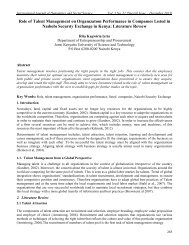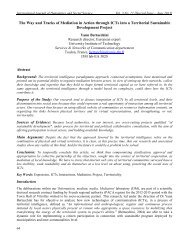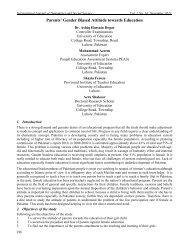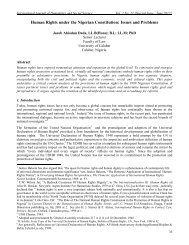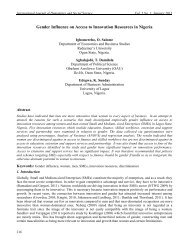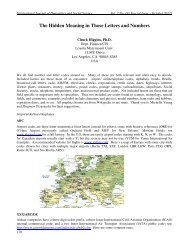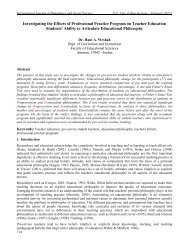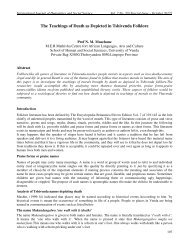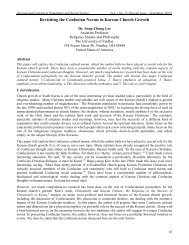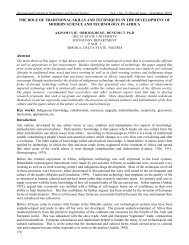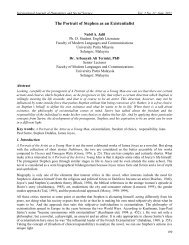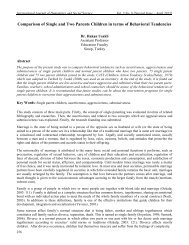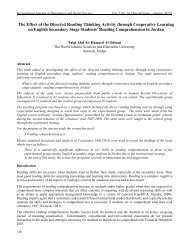Professor Dr. Muhammad Rashid Dean Faculty Of Education
Professor Dr. Muhammad Rashid Dean Faculty Of Education
Professor Dr. Muhammad Rashid Dean Faculty Of Education
You also want an ePaper? Increase the reach of your titles
YUMPU automatically turns print PDFs into web optimized ePapers that Google loves.
International Journal of Humanities and Social Science Vol. 1 No. 20; December 2011<br />
IMPACT OF GUIDANCE AND COUNSELING ON ACADEMIC PERFORMANCE<br />
Amir Mehmood<br />
Doctoral Research Scholar<br />
Preston University, Islamabad, Pakistan<br />
<strong>Professor</strong> <strong>Dr</strong>. <strong>Muhammad</strong> <strong>Rashid</strong><br />
<strong>Dean</strong> <strong>Faculty</strong> of <strong>Education</strong><br />
Preston University<br />
Islamabad, Pakistan<br />
<strong>Muhammad</strong> Azeem<br />
Assessment Expert<br />
Punjab <strong>Education</strong> Assessment System (PEAS)<br />
University of <strong>Education</strong><br />
College Road, Township, Lahore, Pakistan<br />
Introduction<br />
According to Gururani,G.D. (2006,p-1) Guidance is commonly understood as leadership, instruction or direction.<br />
Counseling may also be taken as a psychological process of helping an individual to achieve his self-direction,<br />
self-understanding and mental balance necessary to make the maximum adjustment to the school, home and<br />
society. Bhatnagar & Gupta (1999) view guidance as a process of helping individuals to find solutions of their<br />
problems. They further say that guidance is an integral part of education; a continuous service; both generalized<br />
and specialized service, for the “whole” child and is not confined only to some specific aspects of his personality.<br />
Guidance and counseling has been conceptualized as a programme of activities which has provided us with the<br />
gateway out of the existing numerous problems in our present age of complex scientific and technological<br />
development (Okobiah and Okorodudu 2004).<br />
The country like Pakistan wherein the literacy level is already falling below the desired level as well as drop out<br />
ratio is alarming, an optimistic scenario could be arisen by applying guidance and counseling techniques to<br />
improve the academic performances of the students. Olayinka (1996) and Yahaya (2003) view that passing<br />
examination to secure certificates either for admission into higher institution or secure good jobs is the main goal<br />
of education to many people and not the acquisition of knowledge and skills through studying. Many students<br />
perform poorly because they lack the right attitude to study and do not have the right orientation from home and<br />
from the society (Obilade, 1987; Ladipo, 2000; Eweniyi, 2002). The attitudes of human beings play significant<br />
role in their behaviours.<br />
The study of human habits and attitudes is relevant and essential to counseling, as it can help in the understanding<br />
of the rationale for their behaviour and provides basis for prediction and assistance. Abiri (1996) argued that if the<br />
society is not to be plaque by a band/group of disgruntled, frustrated and unrealistic individuals, it is desirable that<br />
adequate guidance and counseling and career information be provided, to enable the school and society arrive at a<br />
realistic vocational choice for their children/wards with due realization of their potentialities. Akpama (2005)<br />
perceive that the issue of sex and academic performance has attracted reports while some propose that males<br />
perform better than females in academics, others argue that the reverse is the case, and still another group says<br />
that the difference in performance between the two is insignificant.<br />
Guidance services are presented by Nwachukwu (2007) as information services, placement services, appraisal<br />
services, vocational guidance services, counseling services, referral services, evaluation, follow-up, consultancy<br />
and research services. As a vital component of any type and any level of education the absence of non utilization<br />
of these services in the present day school system has led to the unprecedented rise in the crime wave, violence<br />
among students, fuelled cultism, wrong career choice, and wrong subject combination among other issues.<br />
Attitudes are predispositions which have developed through long and complex process. According to Braddock<br />
(2001) the purpose of guidance and counseling services for school children are to:<br />
282
The Special Issue on Contemporary Research in Social Science<br />
© Centre for Promoting Ideas, USA<br />
<br />
<br />
<br />
<br />
Improve academic achievement<br />
Foster positive attitudes toward school learning, and work<br />
Increase acquisitions and application of conflict resolution skills.<br />
Decrease dropouts.<br />
Ubana (2008) in her research study on the attitude of secondary school students towards guidance and counseling<br />
services in Yakurr local government area of Cross River State came out with the findings that students attitude<br />
towards guidance and counseling services was negative and that sex of the student and the geographical location<br />
of the school had no significant influence on students attitudes toward guidance and counseling services.<br />
According to Gysbers and Henderson (2001), guidance and counseling evolved from a position, to a service, and<br />
finally to a program expectations of the majority of the students were being met by the guidance and counseling<br />
services. Gururani, G.D. (2006,p-195) adds that broadly speaking, „Counseling‟ includes all of those personal<br />
contacts with students by individuals who are consciously attempting to understand and assist them by the<br />
specific procedures utilized in personal interviewing.<br />
Statement of the Problem<br />
In this modern age, guidance and counseling can play a pivotal role for improving the academic performance of<br />
the students at all level by eliminating the hurdles faced by students in their studies. Guidance and counseling is<br />
very important subject both for teachers and teachers training institutions, but unfortunately, its importance has<br />
not been visualized as per the desired level in our educational institutions. If a child is properly guided in school<br />
particularly at elementary level, more optimistic results could be achieved. Students various problems including<br />
absenteeism and drop out ratio can also be controlled and eliminated by conducting proper guidance and<br />
counseling programmes. Unfortunately, there is no strong mechanism of formal guidance and counseling concept<br />
in our institutions neither there is an appointment of full or part time counselors in schools. To prove the<br />
importance of guidance and counseling, the researcher undertook the topic of his research project “impact of<br />
guidance and counseling on academic performance”.<br />
Research Methodology<br />
Population, Sample Design, Research Design and Instrument Development<br />
Pretest-posttest designs are the preferred method to compare participant groups and measure the degree of change<br />
occurring as a result of treatments or interventions. Therefore, to study the effect of guidance and counseling on<br />
academic performance of the students in the subject of science pre-test and post test control group design was<br />
applied. The target population for the study were elementary students both male and female studying in schools in<br />
district Lahore. The sample of the study was drawn from 7 th grade students. The researcher selected a private<br />
school where a sample of both male and female students can be drawn. Therefore, Al-Falah Academy high school<br />
was chosen by applying purposive sampling technique where both boys and girls of grade seven were available.<br />
Borg and Gall (1983) have suggested that in causal comparative and experimental research, it is desirable to have<br />
a minimum of 15 cases in each group to be compared. A group of 25 students are considered manageable for<br />
guidance services. Hence research required 50 students, 25 for experimental group and 25 for control group.<br />
There were two sections of 7 th class in this school. One for female students comprising 30 students and the other<br />
comprised 18 male students. For experimental group 24 total students (15 female and 9 male) were selected<br />
randomly by using random table from all the 48 students of class 7. However, one male student of the control<br />
group could not attend the post test, therefore; only eight male students of the control group were considered for<br />
the said study. To see the impact of guidance and counseling on students‟ academic achievement in the subject of<br />
science a comprehensive achievement test in the subject of science was developed based on the 7 th class science<br />
curriculum already given to the students by the teacher. The test consisted of multiple choice items, short<br />
questions and one long question. Rubrics were developed for test marking to maintain standards. For the study<br />
two groups pre-test and post test experimental design was applied. The students of experimental and control<br />
group were selected randomly. Experimental group had a treatment package consisting of guidance and a<br />
combination of counseling both at group and individual level.<br />
Treatment schedule:<br />
1. Guidance and counseling services were provided to the experimental group daily for one<br />
session of 45 minutes.<br />
283
International Journal of Humanities and Social Science Vol. 1 No. 20; December 2011<br />
Treatment<br />
284<br />
2. Seventeen sessions of group and individual guidance and counseling were conducted during<br />
the study comprising each session of 45 minutes.<br />
3. Counseling sessions of 10-15 minutes for individual students were arranged during these<br />
sessions wherein individual students‟ problems were discussed.<br />
The treatment lasted seventeen sessions with an average of five sessions of forty five minutes weekly. Guidance,<br />
individual and Group counseling of the experimental group were done.<br />
Results and Discussions<br />
Experiments that apply same kind of treatment can apply a test or measurement in two places: before the<br />
treatment, which is a pre-test and after the treatment, which is a post-test. This allows for identifying change<br />
caused by the treatment by comparing before and after results from a similar test (for example a change in skill,<br />
attitude, etc.). One way to compare the groups on differences between post-test and pretest, sometimes<br />
called change scores or gain scores which can be carried out in a number of equivalent ways:<br />
<br />
<br />
<br />
t-test of the differences;<br />
2-group ANOVA of the differences,<br />
repeated measures analysis of variance.<br />
We used the first two techniques along with descriptive analysis to analyze the data by using SPSS version 12.<br />
H1: There is no significant difference of experimental and control group students’ achievements in pre-test.<br />
Table 1. Pre test score(total group)<br />
N Mean Std: df<br />
Mean T-value Sig.<br />
Deviation<br />
Difference<br />
Experimental 24 30.50 12.24 45 2.67 .719 0.476<br />
Control 23 27.83 13.25<br />
The analysis of data shows that there is no significant difference of pre-test scores of experimental and control<br />
group. Since the mean difference is very small i-e 2.67. Therefore, the two groups are statistically same.<br />
H2: There is no significant difference between the experimental and control group in their academic<br />
performance at the end of treatment.<br />
Table 2. Post-test score(total group)<br />
Groups N Mean Std: df<br />
Mean T-value Sig<br />
Deviation<br />
Difference<br />
Experimental 24 36.92 9.82 45 6.83 1.87 0.068<br />
Control 23 30.09 14.81<br />
The analysis of the data shows that there is no significant difference of post-test scores of experimental and<br />
control group. However, the mean difference 6.83 is greater than the mean difference of pre-test scores of<br />
experimental and control groups. It reflects that the mean difference is due to the impact of guidance and<br />
counseling of the experimental group. It is explored that the mean score of experimental group is 36.92 while<br />
control group is 30.09. It means, the mean score of experimental group is 6.83 more than control group. It reflects<br />
that there is increase in achievement of experimental group students‟. The increase in achievement is due to<br />
various factors including impact of guidance and counseling. Therefore, the graph shows that even the impact of<br />
guidance and counseling after the treatment is not significant however, the treatment improves the achievement of<br />
students.<br />
H3: There is no significant impact of guidance and counseling on students achievements in subjective type<br />
questions.<br />
Table 3. Post test score (subjective type)<br />
Groups N Mean Std: df<br />
Mean T-value Sig<br />
Deviation<br />
Difference<br />
Experimental 24 13.42 4.81 45 3.89 2.09 0.41<br />
Control 23 9.52 7.65
The Special Issue on Contemporary Research in Social Science<br />
© Centre for Promoting Ideas, USA<br />
The results of analysis show that there is significant difference in subjective type scores of experimental and<br />
control group. Therefore, the null hypothesis “There is no significant impact of guidance and counseling on<br />
students‟ achievements in subjective type questions” may be rejected at significant level of 0.05. It reflects that<br />
guidance and counseling have a positive impact on the experimental group.<br />
H4: There is no significant impact of guidance and counseling on students’ achievements in objective type<br />
questions<br />
Table 4. Post test score (objective Type)<br />
Groups N Mean Std: df<br />
Mean T-value Sig.<br />
Deviation<br />
Difference<br />
Experimental 24 23.50 5.44 45 2.98 1.50 .138<br />
Control 23 20.52 7.91<br />
The mean score of experimental group in objective type questions is 23.50 while mean score of control group is<br />
20.52. Therefore, the mean score of experimental group is 2.98 more than control group. The difference (2.98) in<br />
mean score is not even significant however, achievement of experimental group is better than achievement of<br />
control group. Various factors contribute towards better achievement of experimental group including guidance<br />
and counseling. The minute difference of mean scores of experimental and control groups may indicate that both<br />
groups have same skills of learning or memorization. If we consider memorization then we can say that both<br />
groups use rote learning therefore, the results of analysis shows that there is no significant difference in objective<br />
type post-test scores of experimental and control group. Therefore, the null hypothesis “There is no significant<br />
impact of guidance and counseling on students achievements in objective type questions” may not be rejected at<br />
significant level 0.05.<br />
H5: There is no significant impact of guidance and counseling on male students achievements.<br />
Table 5. Post test score (Male)<br />
Groups N Mean Std: df Mean T- Sig.<br />
Deviation<br />
Difference value<br />
Experimental 9 32.44 6.27 15 16.32 4.44 0.00<br />
Control 8 16.12 8.80<br />
The results of analysis show that there is significant difference of the post-test scores of male students of<br />
experimental and control group. Therefore, the null hypothesis “There is no significant impact of guidance and<br />
counseling on male students‟ achievements” may be rejected. Analysis shows that guidance and counseling have<br />
greater impact on male students‟ performance.<br />
H-6: There is no significant impact of guidance and counseling on female students achievements.<br />
Table 6. Post test score (Female)<br />
Groups N Mean Std: df Mean T- Sig.<br />
Deviation<br />
Difference value<br />
Experimental 15 39.60 10.75 28 2.06 .506 .617<br />
Control 15 37.53 11.62<br />
The analysis of the data shows that there is no significant difference of post test scores of female students of<br />
experimental and control group. Therefore, the null hypothesis “There is no significant impact of guidance and<br />
counseling on female students achievements” may not be rejected. The different impact of guidance and<br />
counseling on male and female students is quite astonishing. There is no significant impact of guidance and<br />
counseling on female students. It may be due to the social cultural values of our society, because majority of our<br />
female students, generally, stay at home after school and have more attention on studies due to availability of<br />
sufficient time for study at home, may not need guidance and counseling as compared to the male students.<br />
Various earlier researches on selection of suitable format of questions for test construction concluded that<br />
objective type questions are treated as easy test items as compare to other formats of question especially<br />
constructed response questions. Most of the objective type questions fall in the general understanding skills of<br />
cognitive domain. Therefore, objective type questions do not require necessary intellectual abilities.<br />
285
International Journal of Humanities and Social Science Vol. 1 No. 20; December 2011<br />
There is also guessing chances in attempting objective questions. Therefore, even without any learning, students‟<br />
may attempt objective type question correctly. The results show that the performance of the students of<br />
experimental groups on objective type questions is better than the control group Therefore, it may be concluded<br />
that guidance and counseling including other factors improves the students‟ achievements on objective type<br />
questions.<br />
Findings<br />
The researcher found that:<br />
1. Students of grade VII are facing problems regarding guidance and counseling.<br />
2. The problems of students‟ may be resolved or minimized by proper guidance and counseling.<br />
3. The impact of guidance and counseling on achievement of male students‟ is greater than the achievement<br />
of female students.<br />
4. The impact of guidance and counseling on achievement of students‟ on subjective type questions is<br />
greater than other objective type questions.<br />
5. Students‟ at elementary level face problems of different nature most of which are of common in nature<br />
which can be solved or minimized through proper guidance and counseling. The study revealed that<br />
guidance and counseling services have a positive effect on students‟ academic achievements. As well as<br />
the results of the study are concerned, it is concluded that<br />
(a) Experimental group shows better results as compared to the control group in both subjective<br />
and objective type tests including male and female students, however, significant difference<br />
could not appear between them.<br />
(b) No significant difference appeared in post-test results of both experimental and control<br />
groups of the female students‟.<br />
(c) A significant difference showed in post-test results of both male and female students‟ in<br />
subjective type test.<br />
(d) Post-test results of male students in the objective and subjective tests reflected a significant<br />
difference between experimental and control groups.<br />
Conclusion<br />
<br />
<br />
<br />
<br />
<br />
Guidance and counseling is necessary for all students especially at elementary level.<br />
Guidance and counseling improves the achievement of students.<br />
Guidance and counseling improves students‟ achievement in subjective type questions.<br />
Guidance and counseling have comparatively low impact on multiple choice items.<br />
Guidance and counseling have greater effect on male students‟ than female students.<br />
Recommendations<br />
On the basis of the results of the study, it is recommended that:<br />
<br />
<br />
<br />
Guidance and counseling services should be started in schools by appointing full time counselors in each<br />
school.<br />
The subject of Guidance and Counseling may be taught as a compulsory subject in all teacher training<br />
institutions at bachelor and master degree level.<br />
The study may be replicated by:<br />
(a) Including rural and urban students<br />
(b) Increasing the sample of study<br />
(c) Increasing the duration of treatment<br />
286
The Special Issue on Contemporary Research in Social Science<br />
© Centre for Promoting Ideas, USA<br />
References<br />
Abiri, J. O. O. (1996). The educational attitudes of some Nigerian adolescent grammar school<br />
African Journal of <strong>Education</strong> 10(3) 118 – 121<br />
Adigwe, J. C. (1992). Gender differences in chemical problem solving amongst Nigerian<br />
Research in Science and technological <strong>Education</strong>, 11(20 187 -198.<br />
Akinboye, J. O. (1974). Study habits modification study attitude changes and academic,<br />
Unpublished<br />
pupils. West<br />
students.<br />
performance.<br />
Akinboye, J. O. (1980). How to study and pass important examinations: A psychological approach. Ibadan:<br />
Maritima, Printers<br />
Annis, L. and Davis, IK. (1978). Study techniques and cognitive styles: their effect on recall and recognition.<br />
Journal of <strong>Education</strong>al Research. 71, 175 -178<br />
Anastasi A. (1990), Psychological testing. New York: Macmillan Publishing Co.<br />
Bhatnagar, A. & Gupta N. (1999) Guidance and Counseling. Bol. II. New Delhi: National Council of <strong>Education</strong>.<br />
Borg, W.R & Gall, M.D. (1983). <strong>Education</strong>al Research in Introduction, New York: Longman Inc.<br />
Braddock, L. Guidance Programme Pages, Retrieved from www.feps.com 5.2.2011, Handbook.<br />
Carrell, S. E., & Carrell, S. A. (2006). Do lower student to counselor ratios reduce school disciplinary problems?<br />
Contributions to Economic Analysis & Policy, 5(1), Article 11. Available athttp://www.bepress.com/<br />
bejeap/contributions/ vol5/iss1/art11<br />
Corey, M. S. and Corey, G. (1992). Groups: Process and practice (4th ed.) Pacific Goove. CA: Brooks/Cole<br />
Dawo, M. L., Adamu, N. N. and Olayomi, I. (2005). Impact of study habit counselling, on academic performance;<br />
A case study of Kashim Ibrahim College of <strong>Education</strong> (Kicoe) Maiduyun. The Counsellor, 21,447 - 256.<br />
Denga, (1983). The counsellor in a Developing Nation: Problem and prospects, Jos, Savannah press.<br />
Denga, D. I. (2001). Guidance and counselling in school and non school settings. 2nd ed. Port Harcourt Double<br />
Diamond publications<br />
Dennis, W. and Dennis, M. (1976). The intellectually gifted., new York: Grune and Stratton.<br />
Edet, I. P. (2008). Parents and teachers perception of vocational guidance in secondary school in Calabar<br />
metropolis – Calabar Cross River State. An unpublished post guidance diploma thesis University of Calabar,<br />
Calabar.<br />
Eweniyi, G. D. (2002). The efficiency of moral/religious counselling in checking examination malpractice among<br />
secondary school students in Ogun State. The Nigerian Journal of Guidance and Counselling, 6(1), 47-60.<br />
Eyo,M.B, Joshva, A.M; & Esuong,A.E (2010). Attitude of Secondary School Students Towards Guidance and<br />
Counseling Services in Cross River State , Edo Journal of Counseling vol 3, No1, Calabar, University of<br />
Technology.<br />
Gidado, B. K. (2000). Environmental factors and academic performance of Secondary School Students in Bauchi<br />
State. Abuja Journal of <strong>Education</strong>, 3 (1 & 2), 5 -15<br />
Gladding, S. T. (2004). Counseling: A comprehensive profession (5th ed.). Upper Saddle River, NJ: Pearson<br />
<strong>Education</strong>.<br />
Gururani, G. D. (2006). Guidance and Counseling: <strong>Education</strong>al, Vocational and Career<br />
Planninig, New Delhi: Akansha Publishing House.<br />
Gysbers, N. C., & Henderson, P. (2001). Comprehensive guidance and counseling programs: A rich history and a<br />
bright future. Professional School Counseling, 4, 246-256.<br />
287
International Journal of Humanities and Social Science Vol. 1 No. 20; December 2011<br />
Gysbers, N. C., & Henderson, P. (2006). Developing and managing your school guidance and counseling<br />
program (4th ed.). Alexandria, VA: American Counseling Association.<br />
Hussain, Abid.(2006). Effect of Guidance Services on Study Attitudes, Study Habits and Academic Achievement<br />
of Secondary School Students, Bulletin of <strong>Education</strong> & Research June 2006. Vol.28, No. 1.pp.35-45, IER,<br />
University of the Punjab<br />
Kochhar, S.K. (2000). <strong>Education</strong>al and Bocational Guidance in Secondary Schools. New Delhi: Sterling<br />
Publishers Private Limited.<br />
Maccoby, E. E. and Jacklin, C. N. (1974). The psychology of sex differences. Standard California; Stanford<br />
University Press<br />
Ladipo, S. O. (2000). Rational-emotive therapy and study skills training in the modification of secondary school<br />
students' attitude towards cheating in exam/nations in Oyo Town. Unpublished doctoral dissertation.<br />
University of Ibadan.<br />
Musgrove, W. J. (1973). Journal of the Student Personnel association of teacher education 12: (1) 25 – 31.<br />
Nwachukwu, D.N. (2007). The teacher counsellor for today’s school. Calabar University of Calabar Press.<br />
Obilaode, S. O. (1987). Changing, value - system as a factor in the poor performance of students in public<br />
examination. In A. Dada (Ed), mass failure in public examinations: causes and problems (pp. 65 - 69).<br />
Olayinka, K. S. (1980). The nature of guidance and counselling. Paper delivered at the workshop on the use of<br />
psychological tests in guidance and counselling, organized by the Federal Ministry of <strong>Education</strong> and the<br />
department of guidance and counselling, University of Ibadan. Lagos: Federal Ministry of <strong>Education</strong>.<br />
Okobiah, O. C. and Okorodudu, R. I. (2004). Concepts of guidance and counselling. In issues, concepts theories<br />
and Techniques of guidance and counselling. Benin City: Ethiope Publishing Corp.<br />
Olayinka, M. S. (1993). Guidance and counselling for Nigerian School. Lagos: Lantern Books.<br />
Olayinka, M. S. (1996). Guidance and counselling approaches to examination malpractice. In. E. O. Obet (ed).<br />
School indiscipline and remedies. Lagos; premier Press Publishers.<br />
Onyejiaku F. O. (1991) Psychology of Adolescent: Calabar: Rapid publishers Nig Ltd.<br />
Oriola, U. G. (2003, July 29). JAMB results at a glance. newsage Newspaper, Lagos<br />
Ubom, I. D. (2001). Value orientations, need satisfaction and job performance of public servants in Akwa Ibom<br />
State: A PhD Dissertation of the universities of Calabar, Nigeria.<br />
Ubana, A. N. (2008). Attitude of secondary school students towards guidance and counselling services in Yakurr<br />
Local Government Area in Cross River State. An unpublished B.Ed Thesis, Cross River University of<br />
Technology Calabar.<br />
UNESCO (2000a). Guidance (Module I). France: Agzi Communication<br />
Yahaya, L. A. (2003). Relationship between study habits and attitude of secondary school students toward<br />
examination malpractice in Kwara State. Abuja Journal of <strong>Education</strong>, 15 (1) 216 - 234<br />
Yahaya, L. A. (2004). Effect of group counselling and SQ3R on the study habits of secondary school students in<br />
Ilorin. Journal of <strong>Education</strong>al Research and Development 3 {l), 125-136.<br />
288



